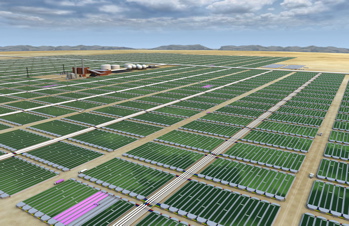 MIT Technology Review has a cool, short piece today on the prospect of using algae to create oil. Apparently, the idea’s been around for a while, but it’s just now beginning to make economic sense. I thought that you might find it of interest. Here’s a clip:
MIT Technology Review has a cool, short piece today on the prospect of using algae to create oil. Apparently, the idea’s been around for a while, but it’s just now beginning to make economic sense. I thought that you might find it of interest. Here’s a clip:
Algae makes oil naturally. Raw algae can be processed to make biocrude, the renewable equivalent of petroleum, and refined to make gasoline, diesel, jet fuel, and chemical feedstocks for plastics and drugs. Indeed, it can be processed at existing oil refineries to make just about anything that can be made from crude oil. This is the approach being taken by startups Solix Biofuels, based in Fort Collins, CO, and LiveFuels, based in Menlo Park, CA…
The theoretical potential is clear. Algae can be grown in open ponds or sealed in clear tubes, and it can produce far more oil per acre than soybeans, a source of oil for biodiesel. Algae can also clean up waste by processing nitrogen from wastewater and carbon dioxide from power plants. What’s more, it can be grown on marginal lands useless for ordinary crops, and it can use water from salt aquifers that is not useful for drinking or agriculture. “Algae have the potential to produce a huge amount of oil,” says Kathe Andrews-Cramer, the technical lead researcher for biofuels and bioenergy programs at Sandia National Laboratories, in Albuquerque, NM. “We could replace certainly all of our diesel fuel with algal-derived oils, and possibly replace a lot more than that.”
I like the idea of algae-filled tubes everywhere.
According to the projections of the folks at LiveFuels, algae could yield up to 20,000 gallons per acre. (I’m assuming that’s 20k per acre, per year.) If that’s true, we could replace all imported oil by dedicating 20 million acres to algae production. (I wonder how big Ohio is.)
[The algae bioreactor image comes from Solix Biofuels.]












20 Comments
If you’re interested in learning more, check out Oilgea dotcom. I know it’s really speculative, but I like having something to be optimistic about.
Ah, nothing like a technological fix to help us continue with our underlying problems. What about natural gas from algae?
Dale: that’s what we have cattle and hogs for…
20 million acres = 31,250 square miles
Ohio = 40,948 square miles
Which puts me in Dale’s camp – the fact that we’d have to devote 3/4 of Ohio’s land area to algae tubes just emphasizes how stuck on oil we are.
Arctic National Wildlife Refuge = 20 million acres. Coincidence?
I look forward to the day when I can power my home off of mold and soap scum.
there are times that i am happy that i don’t have to worry about things like this. my mother and father worried about buggy whips and i’m happy to not have to worry about anysthing. if it weren’t for my grandchildren i’d say fuck all of you —you got yourselves into this get yourselves the fuck out. i live a no footprint life and try to teach my children to do the same, but it’s hard in this day and age. in the thirties when i grew up, you stretched everything as far as it would go–today everything is used up and tossed. my heart breaks when i think of what my children and grandchildren will have to face.
I don’t think growing up surrounded by algae pods would be all that bad. They’re nice and green, like trees.
Dorothy, I love you, but everyone with a computer leaves a footprint. (Sorry.) Your point is well taken though. We live in a nation of giant babies, taught from birth to indulge every whim, to the detriment of us all.
Murph … I think Fritz Crisler would LOVE the idea of turning Ohio into an algae pond.
You wouldn’t like the skeeters, Dorothy, if you lived surrounded by algae ponds.
Remind me again, folks, WHY we need all this oil?
If we need something easily collected that can be cheaply processed and refined for fueling power plants and internal combustion engines … I STILL think collecting soluble human fat at liposuction clinics (even at little booths in McDonald’s parking lots) is a better idea.
Say agin … why all this oil?
I’ll agree with you that some of the things that cheap oil have brought us haven’t been that good. Big box retail, suburbs, and their ilk have torn apart the communities that were the backbone of this country. But, I don’t think you can go from there to say that energy use in and of itself is a bad thing. (I like having hot, running water in my home.) If energy were not a scarce commodity, I wouldn’t see a problem with it being used in enormous quantities. So, I guess I’d say that, for me, it’s more about how the energy is used than it is about the amount of energy used… Does that make any sense?
I got word tonight that there’s a local company starting in this same field. I’ll share details as I get them.
Indeed, there is work being done here in Ann Arbor. Right now it’s really just “research”? and not a company just yet…
Everyone has good points. I’d certainly write a thesis on about this, if not constrained by a lunch break at the moment, so I’l briefly throw out some points, in no way is this intended to be complete, just informative, (if you need footnotes for the numbers, you can email me here).
Quick figures:
US uses 60 billion gallons of petroleum diesel and 120 billion gallons of gasoline today. If a magical eco-wizard suddenly converted all the US gasoline usage to diesel in an overnight *poof*, we’d need 141 gallons of biodiesel.
To yield 141 billion gallons, we’d need:
3 billion acres of soybeans
1 billion acres canola
9.5 million acres algae
In the US:
450 million acres used for crop farming
500 million acres used for grazing
QED: Algae is best answer, only answer [if we consider biodiesel.]
The awesome things about algae diesel as power form:
-We have an existing fuel distribution infrastructure
-It can grow multiple crops/day (that’s why the numbers are so crazy – as opposed to crops/year with other forms.)
-Algae can feed off emissions from factories, etc. This effectively “halves”? CO2 release. Instead of releasing CO2 at the factories and at vehicles, the emissions generated at factories go directly into an algae bioreactor and are eventually only released once by vehicles.
-Algae can be grown anywhere, indoors, outdoors, year round. Which is perfect! Temperature prevents us from making Ohio into a corn farm, but algae? No problem. What would you miss about Ohio? The pro-football hall of fame?
It’s interesting to note how we recoil at the thought of turning our own land into algae farms. As I’m working more on the business end of things, perhaps I need to investigate overseas algae farms. I’m joking. Although some land would be lost, the fact that algae is renewable and can be grown locally changes the whole distribution model and can save the very miles of energy algae is supplying, provide local jobs, reduce local emissions. If a method for extracting human fat via liposuction to use for oil is found, we’ll need that cropland to keep overfeeding ourselves.
I agree with Mark that power usage is not bad. We’re just bad at using power. There are so many tradeoffs* when you consider the total system, dust-to-dust, as with anything. But algae biodiesel is a pretty exciting technology if we can appropriately work it into the system.
Here are some companies and documents to check out.
http://www.greenfuelonline.com/index.htm
http://www.ecn.nl/fileadmin/ecn/units/bio/Overig/pdf/Publ19.pdf
http://www.gs-cleantech.com/
http://www.nrel.gov/docs/legosti/fy98/24190.pdf
http://www.bp.com/genericarticle.do?categoryId=2012968&contentId=7018719
* I.e. A fun LCA case study for math nerds. My boyfriend (who I know will read this and check my math) is single-handedly saving the earth with his determined bicycle riding while I suck blood, burn babies, and shred trees in my devil-worship corporate job. Sometimes he wishes he had a car, though, because it can be convenient. For example, if you love your parents. Or if you’re eating at Tuptim. Anyway. If he ditched his existing rental house refrigerator and started storing food in the sweet efficient fridge I am purchasing for my new home, he would save 600kg carbon/year. Or the equivalent to 3200 miles in a Toyota Prius. Which is probably more than he’d need to get everywhere he needed. Meaning that he could derive social benefit from not riding his bike when it’s 2 degrees out. And I’d worry less about him dying or losing his thumbs in a bike accident. Tradeoffs. http://homeenergy.org/consumerinfo/refrigeration2/refmods.php
I’ve written several several articles over at autobloggreen.com about algae as feedstock for biofuels. Algae definitely has some of the best potential in terms of yields and net energy output, certainly vastly superior to using food stocks like corn and soy. We need to stop giving subsidies to companies like ADM for corn ethanol and focus on programs like algae. There is even work being done on producing hydrogen from bio-engineered algae.
Hey, did you see the PBS NOW program last night about Cambridge, MA green efforts to change energy usage in the city…hoping to realistically and economically reduce the consumption of 50% of residents and businesses and governmental agencies, complete with a plan for individual financing paid for with the expected energy cost savings. Exciting!
Thanks for the tip, Seija. I’ll check it out this weekend, if I can find it online.
how about building a series of narrow algae collection sites along the southern border to solve our foriegn oil dependency and to create a living fence to illegal immagration.dual purpose is always best
I love this idea, Big B. Let’s do it!
…And, just to clarify, you are talking about Ypsi’s border with Ann Arbor, right?
A company is producing a device for your backyard that makes ethanol from sugar …
uses inedible Mexican sugar, which is very cheap, and produces ethanol for your car or truck for less than $1 a gallon. Future models will use other forms of cheap or wasted biomass.
Along with neighborhood power plants for cheap distributive power, we can have a neighborhood fuel pump.
The thin film solar for roofing and siding (commercial and residential) interests me as well.
Lots of these ideas and products in the April 20 NYT Sunday Magazine.
If we merge the two ideas of algae biocrude and farmscrapers, we could save Ohio from being buried in algea farms. So we all have to agree now…this information never leaves this blog! OK?
I think that algae needs sunlight and warmth. As much as I’d love to see Ohio glassed over and pumped full of algae, I think Arizona might provide a better home. Ohio, I’m thinking, is better equipped to handle all of our sewage.